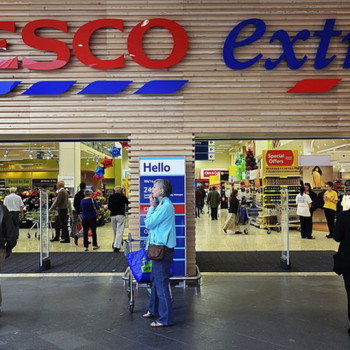Tesco posts worst loss in 96-year history after ‘very difficult year’

Shareholders won't receive a final dividend for 2014/15, but UK core trading beginning to show some early signs of recovery
22 April 2015
Tesco posted an annual loss of 6.4 billion pounds today, the worst in its 96-year history.
Tesco’s Q4/FY results revealed trading profit was 1.4 billion pounds. This was in line with company guidance but less than half of the 3.3 billion pounds made the previous year and the group’s third straight year of decline.
The retailer also reported it had net debt of 8.5 billion pounds and a net pension deficit of 3.9 billion pounds. Tesco has subsequently agreed to pay 270 million pounds per year into the scheme.
‘A very difficult year’
Dave Lewis, Tesco chief executive, said: “It has been a very difficult year for Tesco. The results we have published today reflect a deterioration in the market and, more significantly, an erosion of our competitiveness over recent years.”
However he said the retailer has “faced into this reality” and “begun to rebuild” and is already “beginning to see early encouraging signs from what we’ve done so far”.
“Over the last six months we have put customers back at the centre of everything we do,” said Lewis. “By focusing on the fundamentals of availability, service and targeted price reductions, we have seen a steady increase in footfall, transactions and, most significantly, volumes. More customers are buying more things at Tesco.”
Lewis said Tesco’s performance in the first half of the year was “not competitive enough” and on 23 October 2014, the group set out three key priorities.
Three major priorities
The first of these is “regaining competitiveness in the core UK business”. In an attempt to achieve this, several measures have been introduced so far, including 4,652 net additional customer-facing roles in stores since September. More space has also been allocated for the top 1,000 lines in each store, increasing availability, particularly in peak trading periods.
Tesco’s second priority is “protecting and strengthening the balance sheet”. Progress made towards this goal includes the decision not to pay a final dividend for 2014/15. The capital expenditure budget for 2015/16 has also been confirmed as no more than £1bn. All three Blinkbox businesses (movies, music and books) and Tesco Broadband have been either sold or closed. The retailer has also exited plans to build out 49 stores.
Thirdly, Tesco is placing a focus towards “rebuilding trust and transparency”. The retailer says it has made progress towards re-establishing trust in its pricing policy. Simpler performance measures have also been launched, with a sharp reduction in the number of targets for shop staff.
Lewis said the market is “still challenging” but that the group is “already making good progress” on its initiatives which “will deliver significant cost savings in 2015/16” and will be reinvested into the customer offer.
‘Tentative signs of recovery’
David Gray, retail analyst at Planet Retail, said Tesco recorded its biggest loss in decades “as a result of a writedown on the value of its property portfolio. The simple fact is the value of out-of-town sites has fallen as openings have been mothballed. Although it’s been a disastrous year, Tesco is in effect cleaning out the closet – enabling management to start with a clean slate in 2015/16 upon which to rebuild the business.”
Gray adds: “Range, availability, service and price perception are all understood to have improved under Dave Lewis and Alan Stewart. While concern remains over the state of the balance sheet, the more important metric of the actual health of the business, trading at the core UK unit is showing tentative signs of recovery.”
“Even Europe, a region hit hard in recent years, reported its first quarterly like-for-like increase in a long time, although full year figures were understandably poor. The shift to focus on the most profitable and best performing stores is bearing a little fruit at least.
“Asia is where the real bad news came – a region that despite its growth prospects continues to post widespread like-for-like declines. For the most part, this slowdown can be attributed to factors beyond Tesco’s control – political unrest in Malaysia and Thailand, regulation in Korea, and so on. Regionally, Tesco needs to hang in there, avoiding the temptation of a fire sale of assets in markets with long-term opportunity.”
‘Jack of all trades’ approach won’t work anymore
Hannah Maundrell, chief executive of money.co.uk commented: “Tesco’s results are more shocking than anyone anticipated and it seems clear that the supermarket needs to clean up its act and have a major rethink about its strategy; being a jack of all trades may just not cut it anymore.
“Consumers want transparent pricing, choice and quality goods; today’s results coupled with the impending competition investigation into British supermarkets could bring us one step closer to this ideal. One thing seems clear: we are likely to see more store closures, fiercer price wars and greater emphasis on loyalty as Tesco battle to win back our trust and once again secure their place in our hearts and in our kitchens,” Maudrell added.



 Print
Print



Fans 0
Followers